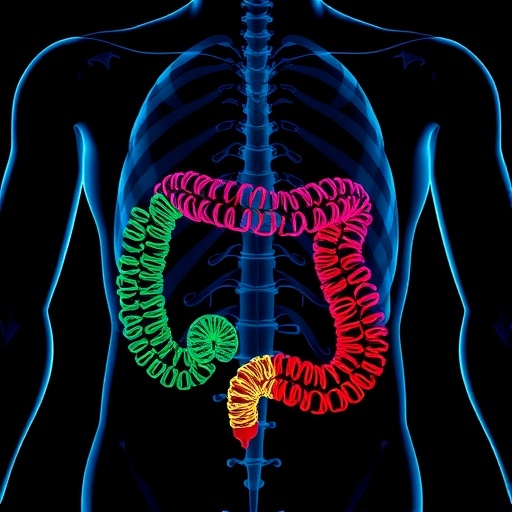Recent advancements in the field of oncology have opened up new avenues for the understanding and treatment of colorectal cancer (CRC), one of the most prevalent types of cancer worldwide. The publication titled “A robust classifier for the intrinsic consensus molecular subtypes in colorectal cancer” authored by Tsantoulis, P., Hong, Y., Wirapati, P., et al., presents a significant milestone in the classification and management of CRC subtypes, demonstrating the importance of precision medicine in today’s therapeutic landscape. This groundbreaking research sheds light on the critical need for tailored treatment protocols aimed at specific cancer subtypes, which can vastly improve patient outcomes.
Colorectal cancer is notably heterogeneous at the molecular level, comprising various intrinsic molecular subtypes that differ not only in their biological characteristics but also in their responses to treatment. Traditionally, cancer classification has relied heavily on histopathological evaluation, which, while still crucial, often falls short in capturing the complexity of the disease. The introduction of molecular profiling has heralded a new era in oncology, enabling clinicians and researchers to better understand the genetic landscape of CRC and its implications for therapy.
The team led by Tsantoulis has developed a novel classifier that effectively identifies and categorizes the intrinsic consensus molecular subtypes (CMS) of colorectal cancer. By leveraging advanced machine learning techniques, the classifier analyzes genomic data to discern patterns that were previously undetectable with standard analytical methods. This robust system represents a paradigm shift that could potentially redefine treatment protocols in the field of oncology by facilitating the selection of more effective, individualized therapies based on a patient’s specific cancer subtype.
One of the key challenges in oncology has been the inability to predict which patients will respond favorably to particular therapies. The research team’s classifier addresses this issue head-on by integrating data from multiple cohorts and employing rigorous validation steps to ensure its reliability. This thorough approach not only adds to the credibility of the findings but also amplifies the potential for clinical application, as it equips healthcare providers with tools that can enhance decision-making processes regarding treatment plans.
The announcement of these findings is particularly timely; as cancer treatment is becoming increasingly personalized, understanding the molecular underpinnings of CRC is crucial. The classification of tumors based on their molecular characteristics can lead to the development of targeted therapies that exploit specific vulnerabilities in cancer cells. This targeted approach is pivotal, given that traditional chemotherapy often leads to suboptimal outcomes accompanied by significant side effects, stemming from its indiscriminate action on healthy and cancerous tissues alike.
Moving forward, creating a standardized system that integrates the classifier into clinical practice could drastically change the landscape of CRC treatment. Researchers anticipate that widespread adoption of such classifiers could shorten the time needed to identify the most suitable treatments for patients, allowing for quicker clinical decisions and potentially improving survival rates. Speeding up treatment pathways in this way will not only enhance the quality of life for patients but may also lessen the burden on healthcare systems, which is critical in light of the growing incidence of CRC globally.
Moreover, the implications of these findings extend beyond individual treatment. Understanding the molecular subtypes of CRC can foster advancements in early detection strategies, allowing for the identification of high-risk populations. Early intervention is strongly correlated with improved outcomes in cancer care, making this research significant not just for therapeutic strategies but also for preventative measures.
Furthermore, collaboration between scientists, clinicians, and technology experts will be essential for translating this research into practice. As the classifier undergoes further validation and refinement, its deployment in clinical settings will require careful integration into existing workflows. Training programs for oncologists and medical professionals will play a critical role in ensuring that these advanced tools are utilized to their fullest potential, leading to patient-centric care.
In addition to its clinical applications, this research paves the way for future studies aimed at exploring other cancer types through similar molecular classification systems. The evolution of machine learning and artificial intelligence technologies presents unprecedented opportunities to analyze complex datasets, providing invaluable insights into tumor biology and behavior. As more data becomes accessible, the classifiers developed in this research could evolve, thereby continuously enhancing diagnostic accuracy and treatment outcomes across various cancers.
As this research gains traction within the scientific community, it is expected to stimulate further discourse and investigation into the molecular landscape of not only colorectal cancer but other malignancies as well. The ongoing dialogue between researchers and clinicians will be critical in ensuring that these findings are disseminated and utilized to their optimal effect, impacting patient care on a global scale.
Ultimately, Tsantoulis and colleagues have taken an important step towards a future where cancer treatment is more scientifically informed and personalized. By harnessing the power of high-throughput genomic analysis and machine learning, they have laid down a template that could serve as a model for future research endeavors. As the world of oncology continues to evolve, it is innovations like these that bring hope for improved treatment strategies and better outcomes for patients facing the battle against cancer.
In conclusion, as the research community rallies around these findings, an exciting new chapter in the fight against colorectal cancer unfolds. With the potential to revolutionize patient care through personalized treatment options and improved classification methods, this study stands as a testament to the power of innovation in science. It highlights the remarkable ability of researchers to reshape our understanding of diseases, ultimately leading us closer to a future where cancer is more manageable, and patient lives are improved.
Subject of Research: Colorectal Cancer Molecular Subtypes
Article Title: A robust classifier for the intrinsic consensus molecular subtypes in colorectal cancer
Article References: Tsantoulis, P., Hong, Y., Wirapati, P. et al. A robust classifier for the intrinsic consensus molecular subtypes in colorectal cancer.
J Transl Med (2025). https://doi.org/10.1186/s12967-025-07363-9
Image Credits: AI Generated
DOI:
Keywords: Colorectal Cancer, Molecular Subtypes, Machine Learning, Precision Medicine, Oncology, Genetic Profiling




